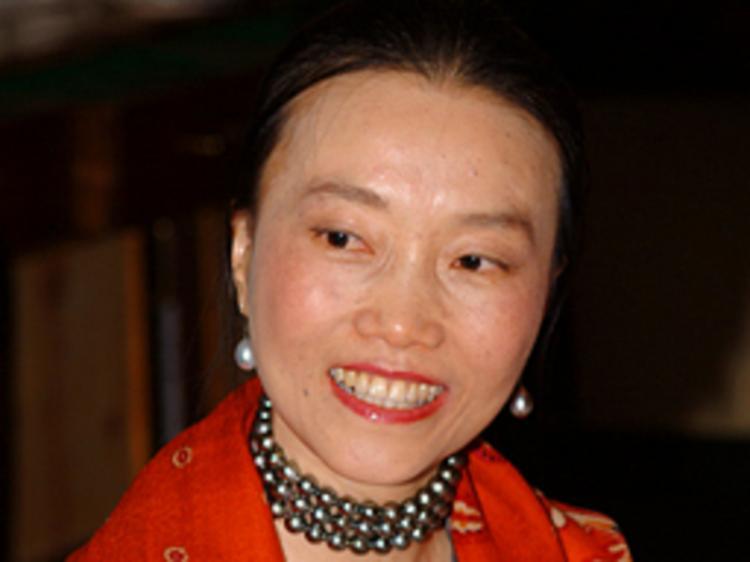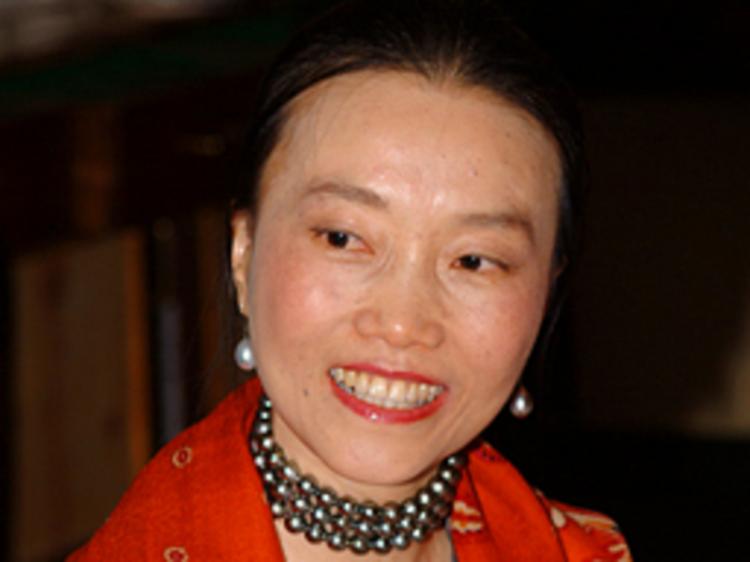The Third Eye
Everyone has it
But most people are unaware of its existence.
Many women in India paint a dot in that location on their foreheads.
Those who have developed their Third Eye can see things, persons and events from other eras and spaces;
One calls them clairvoyants or prophets.
The Chinese poet Ms. Xu Pei, with her recent volume of 50 poems, makes an attempt to bring people closer to the Chinese worldview and customs. She gives The Third Eye poem, above, as an example.
Xu explained that her poems seek to address both old modern China, during an interview with The Epoch Times. The canvas of her poetry is developed from the societal, cultural and political developments in her native land, she says. She is critical of much of the media reports portraying China in the present light, and sees it as her duty to attempt, through her poetry, to tell her understanding of its actual situation.
ET Germany: You named your new German volume of poems The Third Eye. It sounds mysterious. An exiled Chinese woman poet writing in German; that makes people curious. What do you want your readers to gain from your writing?
Xu: The Third Eye is my fifth volume of poetry, and is my attempt to acquaint the readers with traditional Chinese customs and culture and worldviews. I had attempted this with my previous books, such as “Snow Woman.” My examples are either Chinese Daoist or Buddhist writers. For instance, Li Bai is Daoist, and Du Fu is Buddhist. Their poetry had also been translated into German, but word choice and translations by Western Sinologists have led to the loss of half of the meaning of their poems.
The beginning of the last century saw the loss of Chinese culture based on Buddhism, Daoism and Confucianism. The destruction of this ancient culture came about through the influence of the intellectual left, of Marxism, Leninism, Stalinism, and of the Chinese Communist Party. As a Chinese woman born during the Cultural Revolution in Red China, I was not privileged to know much of our traditional Chinese culture. Only while doing graduate studies in Germany was I introduced to traditional Chinese culture and learned of the communists atrocities.
That experience motivates me to bring traditional Chinese culture to our readers, and thereby resist the Communist regime.
ET Germany: The Third Eye refers to compassion for one’s fellow man. That sounds like a Christian concept.
Xu: Compassion for one’s fellow man sounds linguistically to be from Christian culture. But the concept also exists in Chinese culture, where it translates properly as ren ai, and not as bo ai.
Ren means kindness, and ai means love. Ren is the first of five Confucian principles that are ren, yi, li, zhi and xin; in German: kindness, ethics, propriety, learning and honesty, the same core values inherent in kindness, and one is to pattern one’s life after these. I use the concept kindness to express the same meaning. Though I have lived in the West since 1988, Chinese culture influenced me, and I would like to point out the commonalities in both cultures.
ET Germany: German writer, poet and Sinologist Wolfgang Kubin had this to say during a recent Epoch Times interview, “Readers in China place high expectations on Chinese authors. They expect answers to life’s vital questions that are not forthcoming. How do you see German society? Does an equal curiosity exist - to discern what writers have to say and put to pen?”
Xu: In Chinese tradition, writers fill the same role as preachers in the West, to interpret the public’s life struggles. But, the communist system in China has destroyed this traditional option. China’s present authors are communist ideologues and are terrorized by the system. How can they fill that role? I am saddened to be regaled to speak from afar and cannot directly communicate with the Mainland Chinese people. Thank goodness for the Internet, an option for the Chinese people to read my writings, even though it means they have to overcome the communist blockade. My life as a poet in Germany is pleasant, because I can enjoy freedom I would lack in Red China. Writing is a calling, and I write whether or not there might be readers. Fortunately, there are people in Germany in quest of the meaning of life, and my poems may serve as hints.
ET Germany: Kubin stated the presently published writings in China are worthless, thus levying a harsh sentence on the present authors; “it seems one is able to speak one’s thoughts, but not write of them.”
Xu: Communist dictatorship forbids true information and free thought. People lack the background for creativity, making present Mainland Chinese authors the victims of the system. Nevertheless, Chinese authors living in exile have produced excellent writings; for instance, the Mao biography by Chang Jung. Nobel laureate Gao Xinguan has chronicled the life and sufferings of Chinese authors under the Red Regime. There are other good writings that have not yet been translated into German.
ET Germany: Your own website contains a column with texts relating to the 2008 Beijing Olympic Games. According to you, the games did not contribute to an “open China.” Why?
Xu: I am familiar with Nazi history and Communism. That is my reason to cite Heinrich Mann as an example, to boycott the games. Hitler had misused the 1936 games to camouflage his atrocities. China is trying on the one hand to dupe the world’s people to behold an outwardly glorious economic miracle to gain ever more Western investment, while on the other hand this whole event is nothing more than to solidify the regime’s power base while presenting the population with a show. Ever since the democratic movement and the 1989 Tiananmen Square massacre, the regime has attempted to manipulate the masses with its fake appeal to nationalism. Leni Riefenstahl had aided Hitler to dupe the world then, and the Red Regime is doing the same through Zhang Yimou and others, to pull the wool over people’s eyes. How can anyone hope for an “open China” when freedom of the press and freedom of belief are non-existent?






